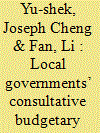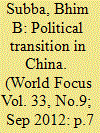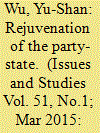| Srl | Item |
| 1 |
ID:
169406


|
|
|
|
|
| Summary/Abstract |
This article analyses distinctive features and contextual causes of the resignation en masse of Chinese government officials in the wake of the 18th Party Congress. Typically, officials who resigned were neither being "ceilinged" nor considered laggards. Instead, they were front runners with proven records, and had stronger achievement orientations and risk-taking personalities. However, three contextual changes triggered the exodus—the heightened risk of pursuing a political career attributed to the unexpectedly relentless momentum of the anti-corruption campaign; intensified work stress due to the reimposed orthodox ideological straightjacket and reinstated Maoist morals; and demoralisation and disillusionment as a result of aggravated nepotism and the condoned practice of anonymous informing.
|
|
|
|
|
|
|
|
|
|
|
|
|
|
|
|
| 2 |
ID:
172269


|
|
|
|
|
| Summary/Abstract |
A large-scale provincial personnel reshuffle took place after the 18th Party Congress. This article examines the biographical information of cadres who were appointed as members of the provincial Party Standing Committee during the 2012–19 period. There is evidence that a relatively young, male-dominated and highly educated team of provincial personnel has formed. The ongoing political elite shift from narrowly trained technocrats to cadres with education backgrounds in the social sciences, humanities and management is also noteworthy.
|
|
|
|
|
|
|
|
|
|
|
|
|
|
|
|
| 3 |
ID:
138450


|
|
|
|
|
| Summary/Abstract |
The Chinese leadership is still reluctant to accept any reforms that are perceived to cause an erosion of the Communist Party of China’s monopoly of political power, although it is eager to improve governance, especially at the grassroots level. Participatory budgetary reforms as represented by the Wenling model are therefore perceived by some academics and local reformers as a channel through which breakthroughs in grassroots democracy in terms of public participation and government accountability can be achieved. Apparently this has gained some support from the top leadership—because some leaders are keen to reduce deficits and ensure budget transparency and accountability in local governments as well as at the top leadership—which now wants to combat corruption. Naturally, there is strong resistance because local governments are unwilling to limit their room for manoeuvre in terms of government expenditure and give up their control of extra-budgetary funds. While existing literature concentrates on the reform model and its rationale, this article offers a detailed empirical description of the actual reform processes at the local level. The Wenling consultative budgetary reforms were lauded and encouraged by Hu Jintao’s report to the 18th Party Congress on 8 November 2012. This offered the official support that the reformers needed, and provided the momentum they required to continue reforms and even promote them in other local governments. Of particular concern, however, is the intention of the Chinese leadership to incorporate this type of consultative mechanism into the framework of the Chinese People’s Political Consultative Conference; such a change would fall below the expectations of those who wish to secure breakthroughs in political participation.
|
|
|
|
|
|
|
|
|
|
|
|
|
|
|
|
| 4 |
ID:
116201


|
|
|
| 5 |
ID:
138153


|
|
|
|
|
| Summary/Abstract |
It is widely recognized that the political system in the PRC is more institutionalized and predictable than in the past, and that its regular rejuvenation is a source of strength. While not denying the virtues of the age-based system, this paper argues that there are limits on the forced rejuvenation scheme. It looks at how cadres on the CCP’s Central Committee are excluded from competing for the top leadership positions because of their age. Four groups of elite are identified, T2 (zongshuji, zongli), SCP-T2 (changwei), PB-SCP (juwei), and CC-PB (zhongwei), and their frustration over exclusion from competing for the T2 positions in the next major leadership turnover (next even-numbered Party Congress) measured (Exclusion and Frustration Rate, EFR). An overall score is also calculated to measure the total frustration with the system (Total Exclusion and Frustration, TEF). It is shown that the EFR and TEF are extremely high, and tension is bound to accumulate in the system. Finally, the Bo Xilai (薄熙來) case is explored to demonstrate how aspiring cadres may be discriminated against by the system and thus inclined to rebel against it. It is advised that instead of simply accepting the system as it stands and calculating how personnel decisions will be churned out, more attention should be given to its limits and sustainability in the long term.
|
|
|
|
|
|
|
|
|
|
|
|
|
|
|
|